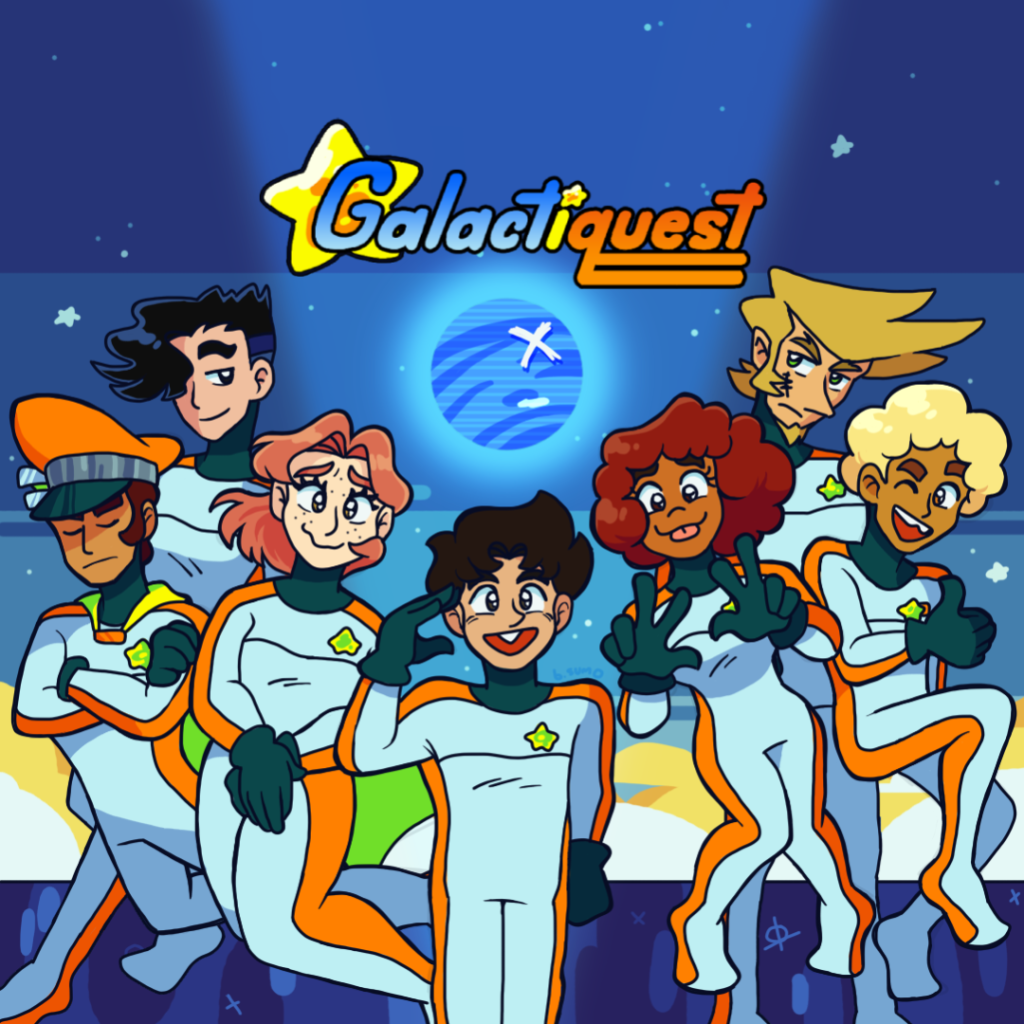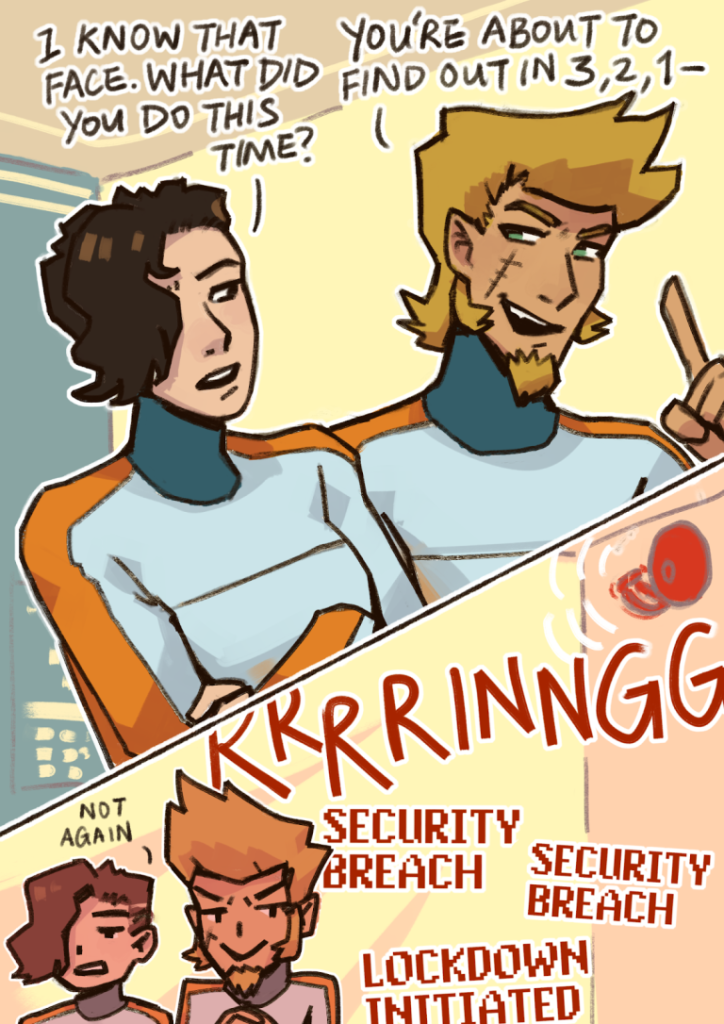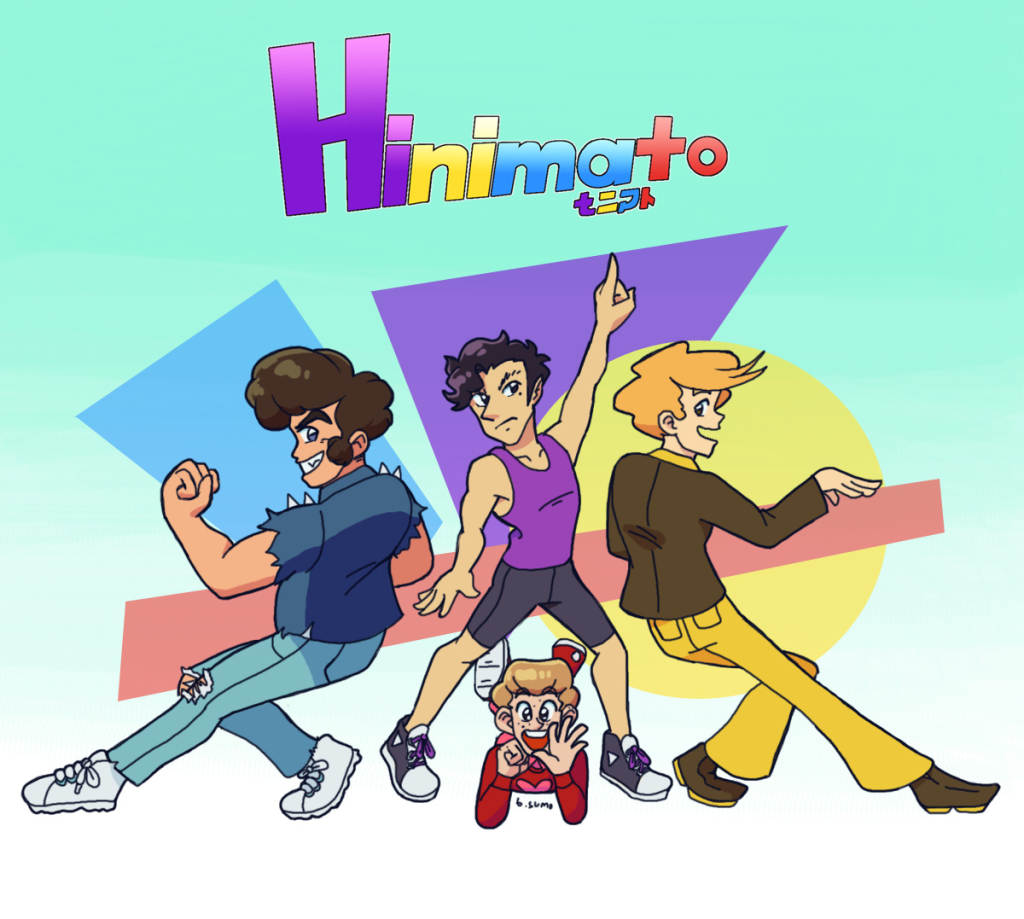Hello, everyone! Welcome back to All Ages of Geek’s special interview series “Creator Spotlight” I’m Emily, writer and LGBTQAI+ analyst, and today we have an amazing treat in store for all of you. We’re joined by Bulgariansumo, the talented author behind the web series Galactiquest! This lighthearted, yet thought-provoking story follows an unlikely space crew on humanity’s first trip to Neptune. Get ready to dive into a world of friendship, found family, and the occasional serious theme surrounding mental health issues. If that sounds like your cup of tea, buckle up and join us as we explore the creative mind behind Galactiquest!
Hello! I’m Bulgariansumo, and I write the webnovel Galactiquest. Galactiquest is the story of an understaffed, mostly underqualified space crew sent on humanity’s first trip to Neptune! It’s generally goofy, lighthearted fun, but the characters struggle with a variety of problems which can lead to more serious themes surrounding things like mental health issues. Ultimately, it’s about friendship and found family, so if that’s your cup of tea, please check it out!
I’d like to thank All Ages of Geek for giving me a chance to ramble about it on their platform.

I’ve liked drawing and storytelling for as long as I can remember, so I don’t remember the details on any specific “spark.” But as for how it evolved, I liked daydreaming stories, and I experienced a lot of different stories that myself and other people really enjoyed. From there, it just kind of slowly developed into the idea of “Hey, maybe I can make a story people like, too!”

I started off making short, jokey fancomics, first to show off to my classmates, and then to post online. Then, I flirted with the idea of making longer stories. My dream was to animate my own series someday, but I struggled to even keep up with longform comics.
During this period is when I came up with my original characters, like the main cast of Galactiquest. I had loose plot points in mind for them and would write out those scenes for fun. Scenes turned into short stories, and short stories turned into longer stories, and before I knew it, I had enough writing to put together a concrete plot. So I did that!
Compared to making webcomics, writing a webnovel is a lot easier for me to keep up with. Working in a medium where I don’t have to draw everything allows me to go deeper with the characters and the plot without cutting things out and speeding things up for the sake of being able to finish the story within my lifetime. I like adding visuals though, so I illustrate for chapters.
For Galactiquest, the characters are the heart of the story. Whatever’s important to them is what gets focused on, and a lot of times, the characters’ struggles overlap in unexpected ways that end up forming themes. Shared struggles include managing the expectations others have of you vs. who you are inside, finding others to connect with after being alienated for things you can’t change, and going from adolescence into adulthood.
If there was one thing I wanted people to take away from the story, I guess it would be “There are more people willing to help you and understand you than you think.” Something like that.

There aren’t a lot of big sites for original webnovels, so I post on a few hoping something will stick. Aside from the large user base, what drew me in to Tapas was hearing how receptive readers were to stories with LGBT+ characters.

I’m aware that Tapas’s gimmick is delivering stories in bite-sized chunks, but my biggest gripe is the 15,000 character limit per update for novels. It’s roughly 2,000 words or so, which is short even for web novels. It’s not a problem for some stories, but for others, having to split up chapters can be awkward and hinder readers’ enjoyment, speaking as a reader.
A sillier gripe of mine is Tapas calling updates episodes. Galactiquest is split up into what I call episodes, which are usually groups of chapters that tell an episodic story. Since Tapas calls every chapter an episode, I worry that when I celebrate having completed 13 episodes of Galactiquest, someone is going to think I’ve only done 13 chapters, when in actuality, it’s closer to 80 (or 140, according to Tapas.)
The creator has full control over their story. Hearing stories of creators signing away their stories’ rights only for it to get butchered or cancelled by a network makes me really sad, but it also makes me thankful to have a way to get my story out there while having it be 100% under my control.
Indie stories aren’t as beholden to things like corporate oversight or trends. Does this mean they’ll always be good or popular? No, but they’ll be from the creator’s heart. I think that’s valuable no matter the quality of the story, and it makes for a great breeding ground for concepts, ideas, and storytelling styles that would otherwise be overlooked in a mainstream setting. From an industry standpoint, this is great for innovation. But even if it didn’t benefit the industry, I think it’s good to have a place to share stories in general.

As I mentioned earlier, my novel is split into episodic installments. In between each episode is a next episode teaser narrated by one of the main characters. While next episode teasers are common in TV shows, having the characters narrate it is something I’ve only seen in anime. It’s a good opportunity for characterization, and I’m not one to pass that up. Also, it invokes the feeling of an animated series, which is what I want Galactiquest to feel like as a whole.
I advertise chapters on social media, and sometimes I’ll talk about the creative process or post pictures that don’t fit in the story. To be honest, I don’t have any project-specific social media accounts, let alone a big enough audience to warrant live events or merchandise. If it gets popular enough, maybe I’ll consider merchandise.
Time management has always been my biggest obstacle. I either focus on creating at the expense of everything else or focus on everything else at the expense of creating. I can’t say I’ve overcome this, but the latter can be a good thing. Sometimes, I come back with new and fresh ideas on how to move forward with the story.

I’ll start with artists, since that’s easier. Deviantart user yocco (@hrn-yc on Twitter) heavily influenced my decision to start incorporating elements from 80’s and 90’s anime into my art style. A lot of my art journey is me trying to mimic artists with bright, expressive styles, and using aspects of their style that I like. Unfortunately, there are so many, I can’t list them all.

There are many stories that probably influenced my writing, but it’s difficult for me to point to any one in particular and say “That’s what inspired me to write!” or “That’s the writing style I want to emulate!” Some of my favorite writers are Hato Moa (creator of Hatoful Boyfriend), Shu Takumi (creator of Ace Attorney series, Ghost Trick), Haruichi Furudate (creator of Haikyuu!!), Yuhki Kamitani (creator of Our Dreams at Dusk), Elizabeth Welch (writer on Avatar: The Last Airbender), and Toby Fox (creator of Undertale and Deltarune). The first two definitely had some effect on my sense of humor. I also admire their shared ability to make the small, silly details pay off in big ways. The next three I mentioned because of their ability to explore characters and their relationships to one another in really heartfelt ways. Toby Fox is a mix of both. All of these writers have done stunning, memorable character work and storytelling. While I may not be able to list all of the exact ways they’ve influenced my own work, they’ve certainly inspired me.
I also want to mention anyone online who has ever analyzed a series, gushed about characters, or talked about something they wanted to see in media. Stuff like this really interests me, even if it’s related to a work I haven’t experienced. I can’t count the number of times I’ve seen someone talking about the things they like about a series, and it helps me put words to something I’ve had in mind for my own. Or the times I’ve read someone’s thoughts on a character dynamic they wish to see or their solution to a missed opportunity and was like “Wait! That sounds like something I’m planning to do!” My hope is to create something worthy of that kind of discussion.
But I think the people who have been the most influential are my friends. They’re all great writers. Talking about my stories and characters with them really helped my writing grow, and I hope I’ve been able to do the same for them. They also helped me learn how to write prose, since my writing influences aren’t normally authors. Sadly, most of them don’t post their work publicly. I can, however, give a shout out to my friend Circlejourney who is behind projects such as:
Offshore, an illustrated webnovel about two competitive sailors’ journey toward their final race as a team, how the sport interacts with their personal lives, and a lot of pining toward each other. It’s complete, and currently in the middle of posting. It’s fresh and sweet!
Compass, a complete browser-based interactive webcomic about two sailors travelling to the edge of the world, with a bond that extends from there and back. Along with the art, writing, and programming, it also features music composed by Circlejourney, making it into an unforgettable experience!
Revolving Door, an ongoing webnovel about a multiverse under threat of extinction and the group of people tasked to save it. Since these people and the worlds they originate from are so different from each other, this story truly has everything you could want. Card-Themed Fantasy? Contemporary Slice of Life? Post-Apocalyptic Survival? Roman Gladiator Battles? Sailing? It’s a grand adventure!
Revolving Door is the first web serial novel I read, and I discovered this roughly around the same time as I decided to start writing Galactiquest seriously, so I don’t know if Galactiquest would exist as it does now without me having read it.
You can read all of these and see more of their projects on circlejourney.net! Here’s some art they did of my Galactiquest characters.

For aspiring content creators, what are some practical tips and advice you would give to help them find their own voice and style?
Have fun! No, seriously, have fun. Enjoy the media that you like and figure out why you like it. Read and watch other people analyze why they like it. Have fun with things that you don’t like, and pick them apart to figure out how to avoid making the same mistakes. Think about the things you want to see and try to write them. Even if it doesn’t turn out good the first time, keep trying. Once you’re able to write something you do like, you may find that your first attempts will come in handy.

I daydream about my projects all the time, so brainstorming ideas about overarching plot details comes kind of naturally.
For each episode though, I start out with an idea of what all I want to cover, then I write an outline of what happens in each chapter. From there, it’s a matter of writing out the chapters. I usually have to move around things on the outline in order to make the story flow better. After I finish writing, I find a couple of scenes that I want to draw out, usually important scenes, entertaining scenes, or ones that I think would make for a good visual. Once those are drawn, I go back to the written portion to edit out any typos. Then I post. …And then I find more typos.
The thing that motivates me most is knowing that I’m the only one who can tell these stories. Switching over to a quicker, easier to edit format (writing instead of making webcomics) helped me stay more consistent, because it’s easier for me and to see my progress.

Finances aren’t something I have to deal with when it comes to my work, at least not yet.
Promotion isn’t something I’ve mastered yet, but posting chapter updates in places where a potential audience is most likely to see it is a simple thing I know I can keep up with. There’s also more “passive” things I learned that I can do for promotion, like making my series have a good first impression. It’s always good to have a nice cover and blurb, but Tapas has all of these optional visual elements, thumbnails, banners, things like that. They’re worthwhile if you want to attract more people to your work, and can double as promo art. Thanks to some really kind people on the Tapas forums, I’ve gotten help with pretty much all of these things!

I haven’t tried funding my work yet. This is more of a hobby than a job for me right now. Something like Patreon would make it a mutual obligation; someone pays me, I write according to a deadline. I’d feel terrible not being able to hold up my end of the bargain when money is involved.
Ko-Fi is something I’ve considered since it doesn’t have the subscription aspect as far as I’m aware. So it’s more like “If you like what I’ve already written, you can donate if you want.” On the other hand, most people I’ve seen with Ko-Fi accounts tend to need it. I’d feel a little weird getting donations knowing that there’s other people who could use the money more than I do.
I don’t.
It’s difficult for me to say, given that I’m not up to date with the trends. One thing I have noticed is that sites like Patreon and Ko-Fi have really taken off as a way for independent creators to fund themselves. That’s been pretty cool to see.
I have, but the plan’s been put on hold for now. I learned some new skills, and it did inspire me to go back and do some edits on the first few chapters. So even if it’s never picked up again, I do appreciate getting to work on it.
I’m coming up on the end of Galactiquest’s first season, or as I call them, arcs. If all goes well, I should have it finished sometime this year. This is probably going to be one of the longer arcs, and it sets up important things like the characters’ dynamics and their personal problems. It’s really exciting to me to have such a big section of the story done!

Once I finish that, I feel like it’ll be a good time for me to start my other longtime project, Hinimato. It’s about a boyband with dreams of taking over their country(‘s charts) and then the world(’s charts.) Set in the 80’s! Or at least their world’s version of it.

I mainly measure success in how much of the story I’m able to get done, and how much I and my friends enjoy it. If I’m able to achieve those things, I’ll have won. Getting more people to enjoy it is a bonus! I’d be lying if I said I wasn’t interested in that, but not getting readers isn’t enough to kill my motivation.
I’m really proud of the last episode I wrote. It marks an important milestone in the story, one that I’ve had for 10 years now, and the execution is some of my best writing yet. The character development, jokes, and dramatic tension came together in a way that I really can’t wait for more people to experience.

A few years ago, someone offered to do a technical analysis on other people’s writing, so I asked if they could read the first episode of Galactiquest. They later told me they were so happy when reading it that they showed their family. I’ve since done quite a bit to spruce up those first eight chapters, but it still warms my heart to know my writing had that effect on a complete stranger.
I’ve gotten some pretty strong reactions from friends too: anger, tears, laughing to the point of tears. The general emotions were expected, but never their intensity. It taught me that I can’t always anticipate how my writing will affect others. I hope to inspire more positive feelings than negative over the course of my projects, but I’m glad my writing is able to make people care so much that they feel this strongly.

If you’d like to check out Galactiquest, I post it on Tapas, Royal Road, and Wattpad. If you want to see my art, hear about my progress, and you don’t mind spoilers, I also post on deviantArt, Twitter, and pixiv (though my posts over there are in Japanese.)
Thanks again to All Ages of Geek for having me!
And that’s a wrap! Thank you so much, Bulgariansumo, for joining us today and giving us an inside look at the wonderful world of Galactiquest. We loved learning about the inspiration behind your characters and the heartfelt themes woven throughout the story. To all of our readers, make sure to check out Galactiquest and support Bulgariansumo’s incredible work. Until next time, this is Emily, your writer and LGBTQAI+ analyst, signing off from All Ages of Geek’s special interview series. Stay geeky, and remember: friendship and found family can make even the most daunting adventures worthwhile!